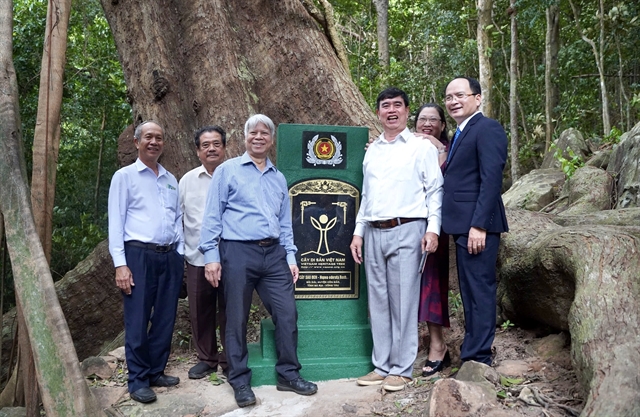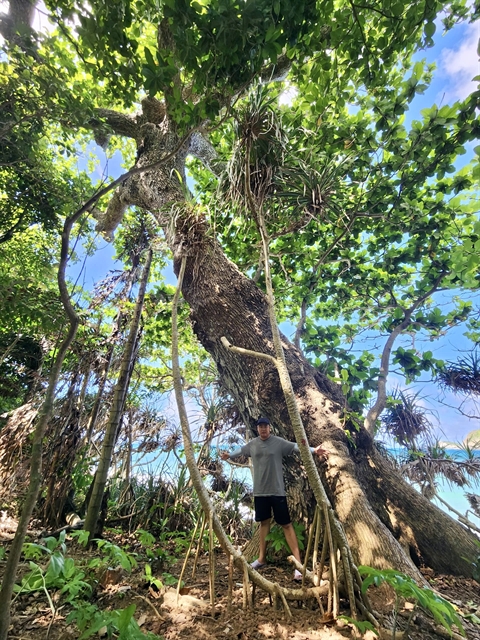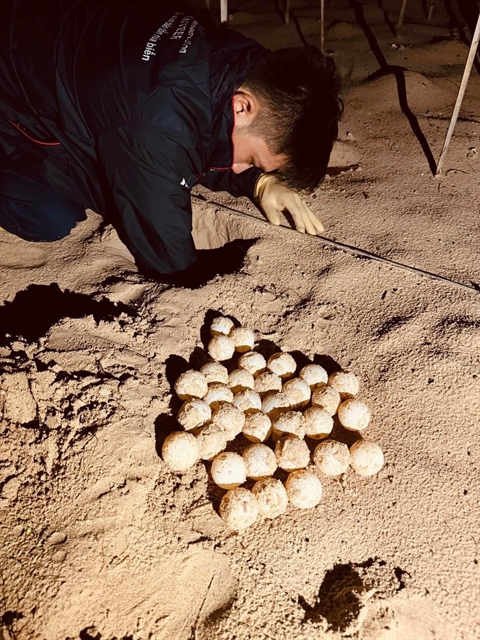The Côn Đảo National Park off the coast of the southern province of Bà Rịa-Vũng Tàu has officially received a certificate for Trứng Island as the ‘seabird sanctuary’ with the highest breeding density, and the Vietnamese ‘heritage tree’ title for 24 ancient trees.
.jpg)
Trứng Island has become a crucial breeding ground for many seabird species. — Photo Courtesy of the park
BÀ RỊA - VŨNG TÀU — The Côn Đảo National Park, located off the coast of the southern province of Bà Rịa-Vũng Tàu, has been officially recognized with a certificate declaring Trứng Island a ‘seabird sanctuary’ with the highest breeding density, and 24 ancient trees as Vietnamese 'heritage trees.’
A certificate ceremony was held last Thursday to mark Việt Nam's Forestry Day (November 28, 1959 - November 28, 2024).
The Việt Nam Record Organisation (VietKings) awarded the park’s management board a certificate recognising Trứng Island as a ‘seabird sanctuary’ with the highest breeding density in the country, boasting an average of 4.88 eggs per square metre.
The islet, which spans nearly two hectares, is estimated to hold around 72,700 seabird eggs.

Trứng Island off the coast of Bà Rịa-Vũng Tàu Province has been recognised as a ‘seabird sanctuary’ with the highest breeding density in Việt Nam. — Photo Courtesy of the park
Trứng Island, located in Côn Đảo District within Côn Đảo National Park, is mostly barren, covered with grass and rocks.
It has become a vital breeding ground for many seabird species such as the black-backed tern (Onychoprion anaethetus), great-crested tern (Thalasseus bergii), white-bellied booby (Sula leucogaster), white-rumped swift (Apus pacificus), and grey-headed tern (Anous stolidus).
These birds typically nest all over the island and forage in the surrounding areas. During the day, they soar above the sea in search of food, alternating their return to the islet to rest, build nests, lay eggs, and care for their chicks.
At the ceremony, the Việt Nam Association for Conservation of Nature and Environment also presented 24 heritage tree certificates to the national park’s management board.

The Côn Đảo National Park has officially received the Vietnamese ‘heritage tree’ title for 24 ancient trees. — Photo Courtesy of the park
The recognised trees include a 237-year-old almond tree on Bảy Cạnh Island, a 155-year-old almond tree on Ông Đụng Beach, a 237-year-old sao đen (Hopea odorata Roxb) tree on Dài Beach, and 21 Phong ba (Heliotropium foertherianum) trees on Cau Island, some of which are 119 years old.
Côn Đảo District is now home to a total of 105 heritage trees.
Nguyễn Khắc Pho, director of the park’s management board, said the recognitions acknowledge the efforts of the park’s management board in preserving and promoting the value of natural heritage, and raising public awareness of sustainable environmental conservation.
“They will motivate scientists, conservation organisations, and local communities to continue research in improving the environment and preserving natural heritage,” he said.
This is also an opportunity to introduce and promote the biodiversity of Côn Đảo for eco-tourism development.

A visitor takes a picture with a ‘heritage tree’ in the Côn Đảo National Park. — Photo Courtesy of the park
On the same day, the park’s management board in collaboration with The International Union for Conservation of Nature (IUCN) also held a ceremony to review the 2024 marine turtle conservation volunteer programme.
Taking place at the park from June 13 to August 21, this year’s programme attracted the participation of 140 volunteers.
This programme was launched for the first time in 2014.
Some 500 volunteers, including students, civil servants, businessmen, freelancers, doctors, lawyers, artists, teachers and journalists, went to Côn Đảo to assist the park’s rangers in sea turtle conservation work during the time sea turtles come ashore to lay eggs from June to September.
Côn Đảo District is an archipelago of Bà Rịa Vũng Tàu Province. This 76sq.km archipelago consists of 16 islands, the largest being Côn Sơn Island. It is about 185km from Vũng Tàu City, 230km from HCM City.
The Côn Đảo National Park covers more than 15,000ha, including over 6,000ha of land and 9,000ha of sea. It comprises 14 islands of Côn Sơn Archipelago, located to the southeast of Việt Nam.
The park is home to 1,077 plant species and 155 animal species.
With its rich biodiversity, the park has been included by the World Bank among the top priority areas of global maritime reserves.

A volunteer assists the Côn Đảo National Park’s rangers in sea turtle conservation work during the time sea turtles come ashore to lay eggs. — Photo Courtesy of the park
In 2013, it was named the world’s 2,203rd wetland of international importance by the Ramsar Convention on Wetlands Secretariat, making this park the 6th Ramsar site in Việt Nam and the first maritime site earning this title in the country.
The park is harbouring and conserving hundreds of vascular plant species, many of which are listed in the Red Data Book.
Meanwhile, the sea turtle conservation programme implemented here for more than the last 30 years has helped recover the population of the rare green sea turtle (Chelonia mydas).
The park was designated as an ASEAN Heritage Park due to its unique marine biodiversity and rich historical and cultural significance.
Last year, it was granted with a certificate of merit from the Prime Minister for its achievements in turtle conservation.— VNS